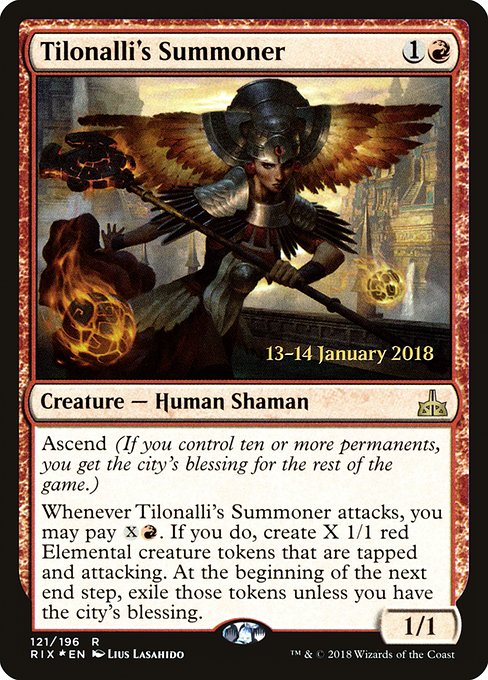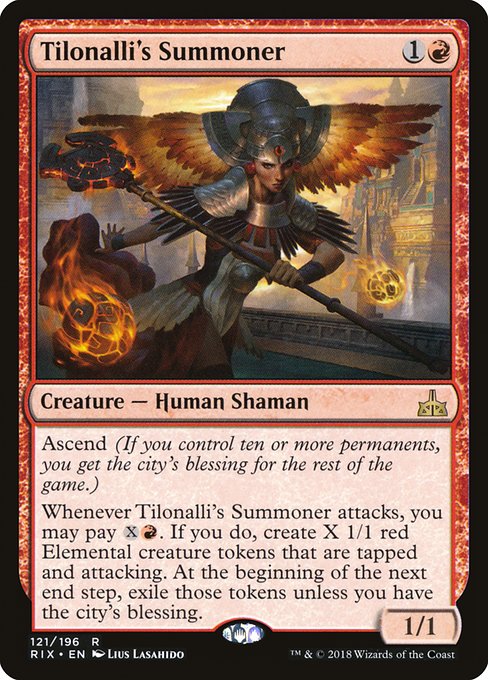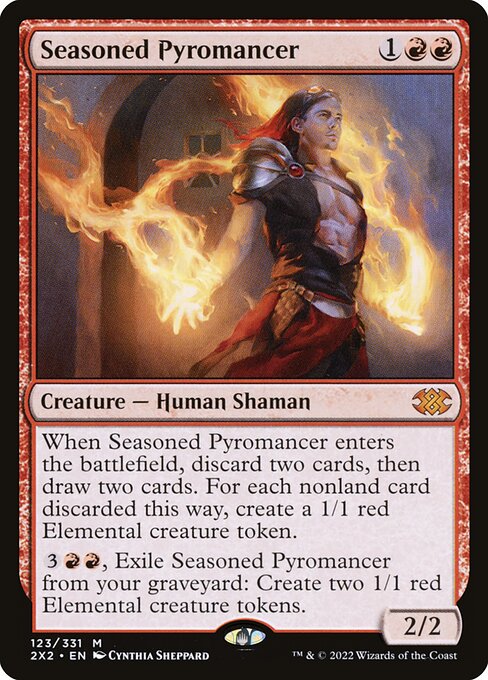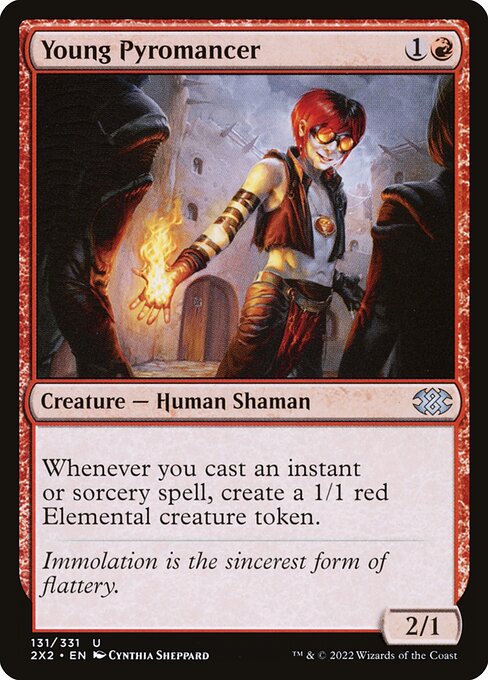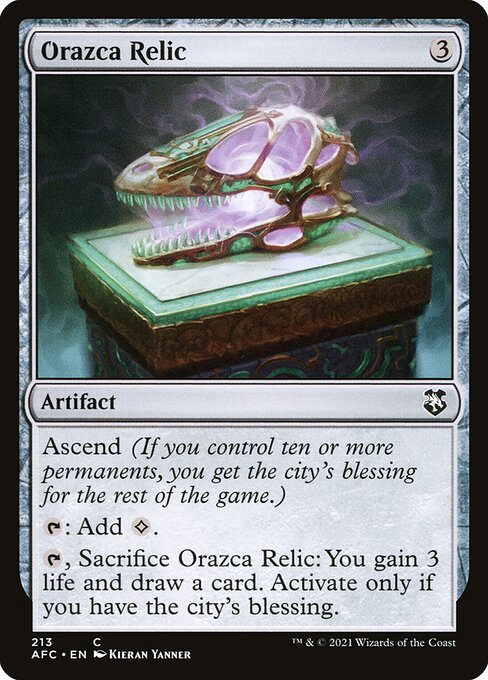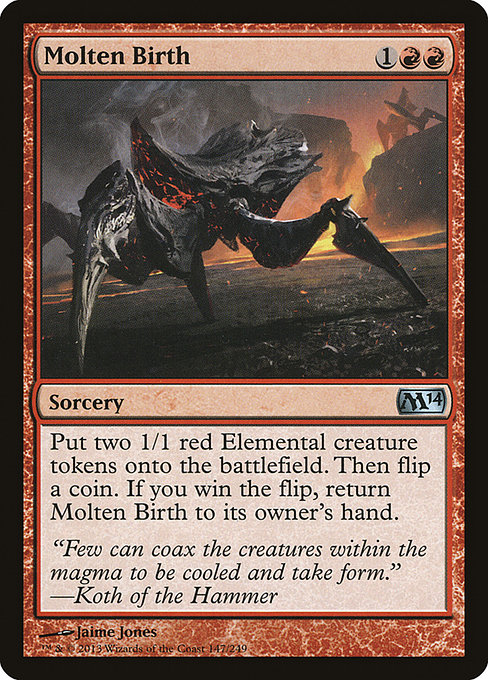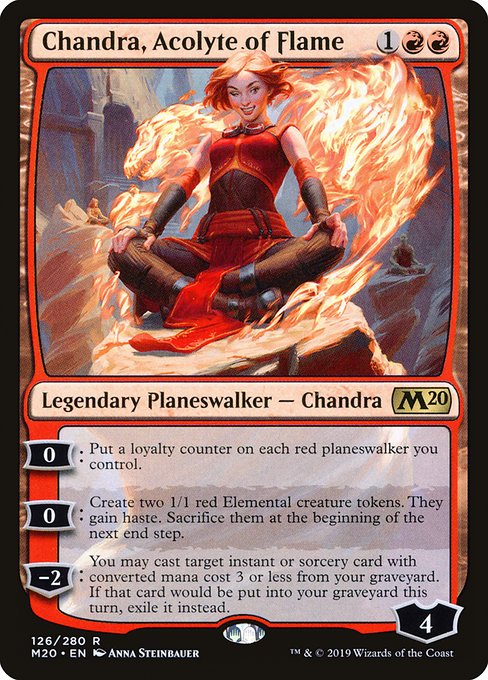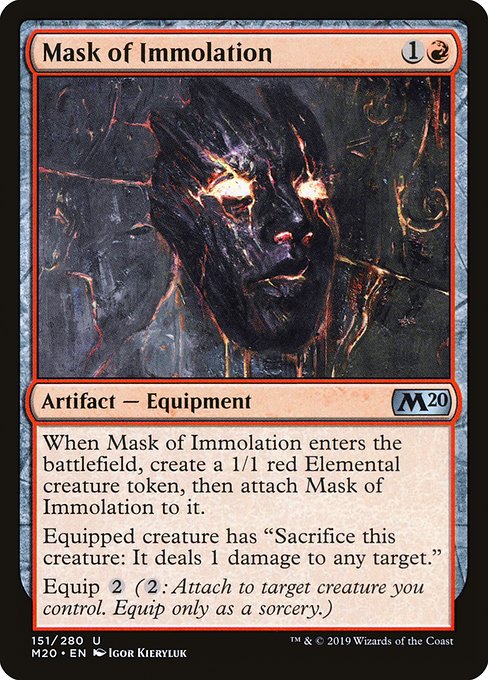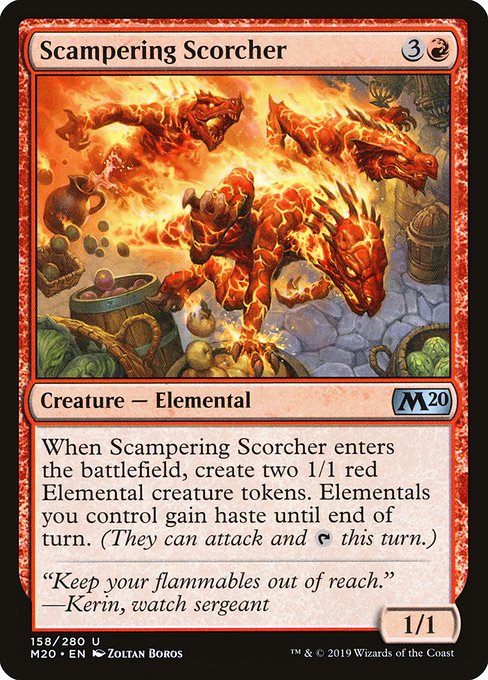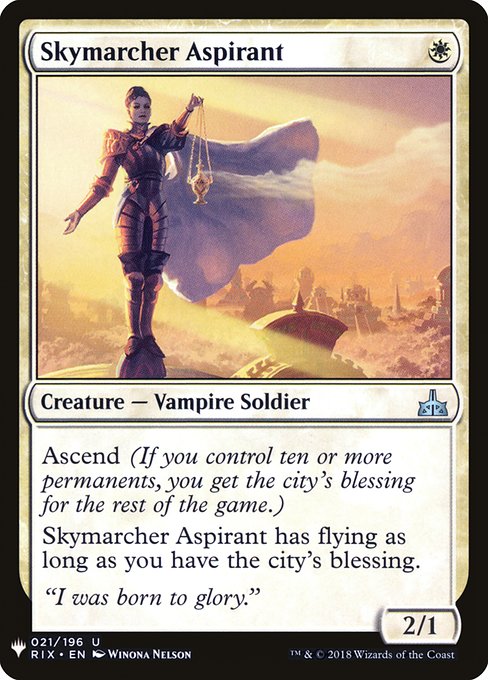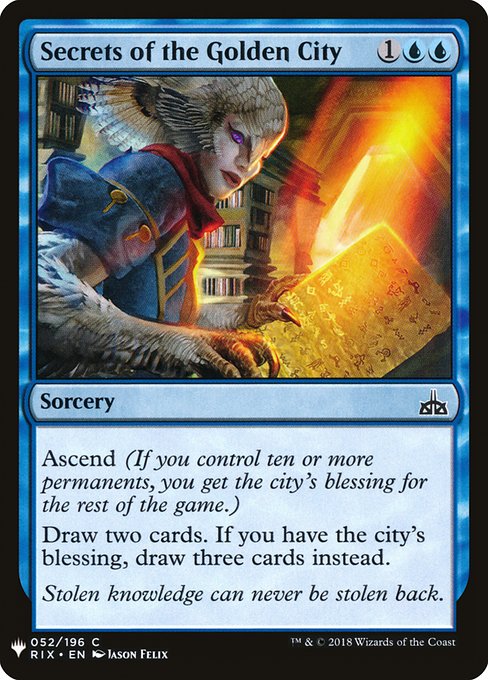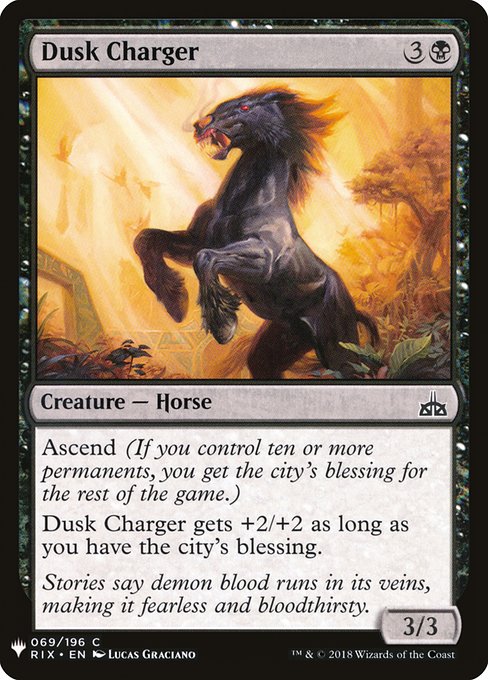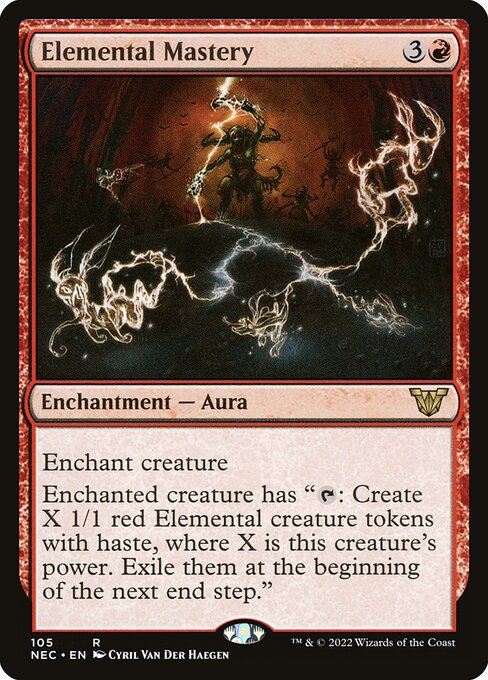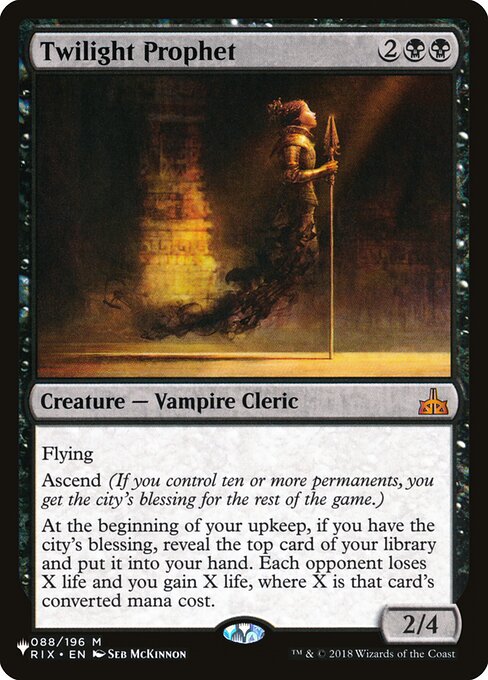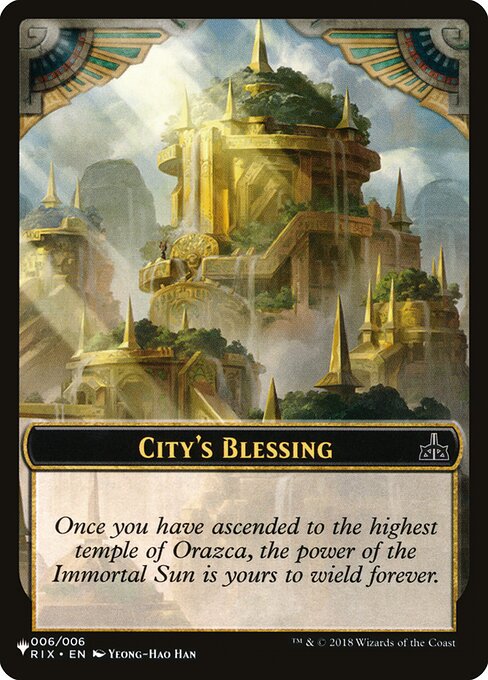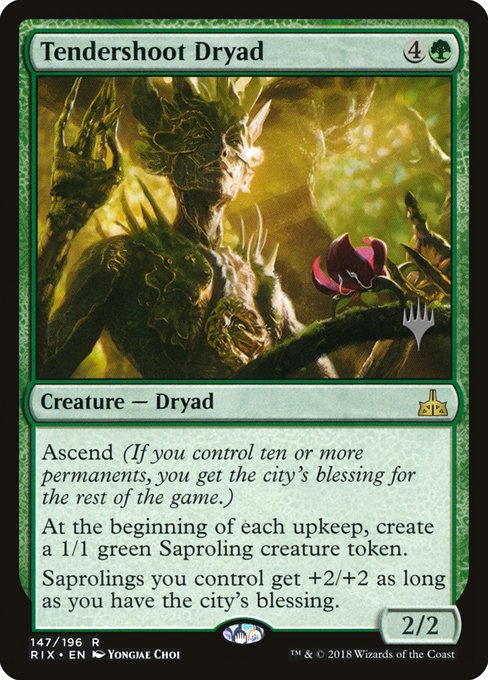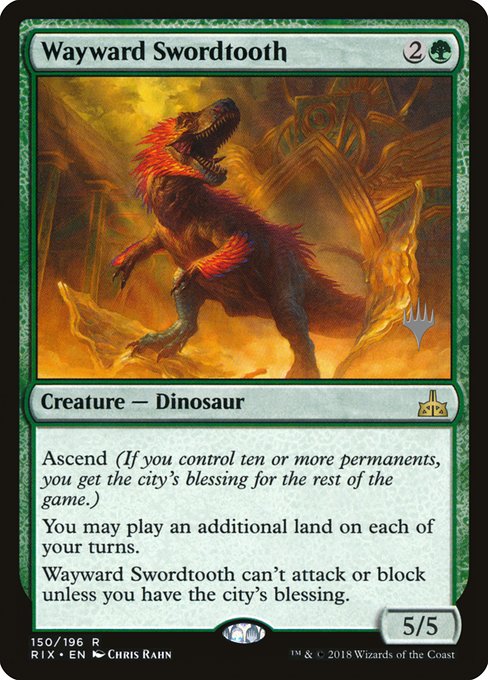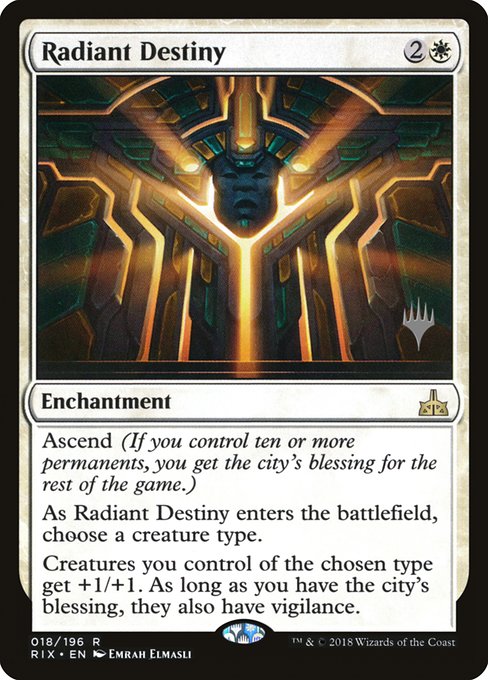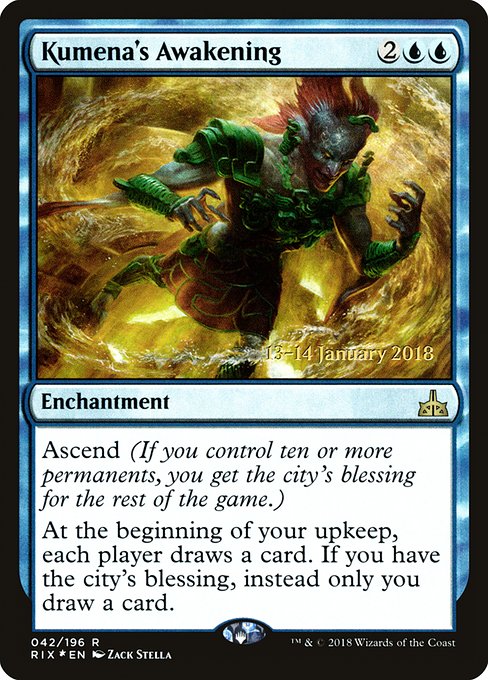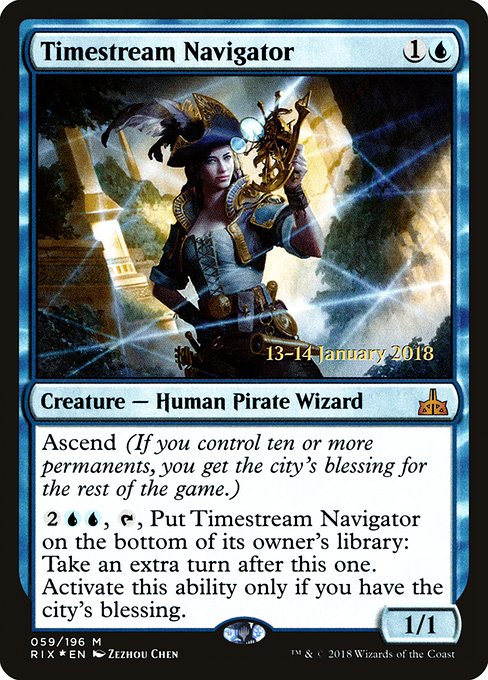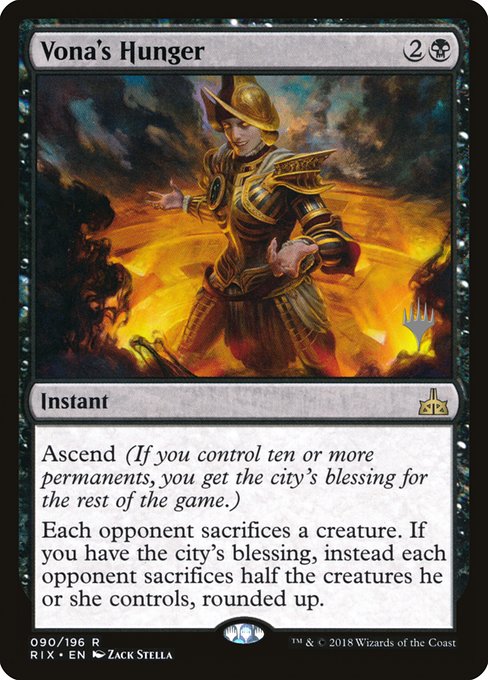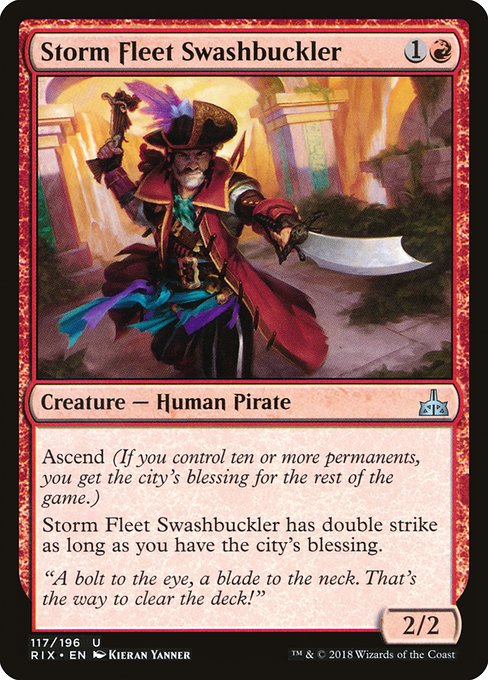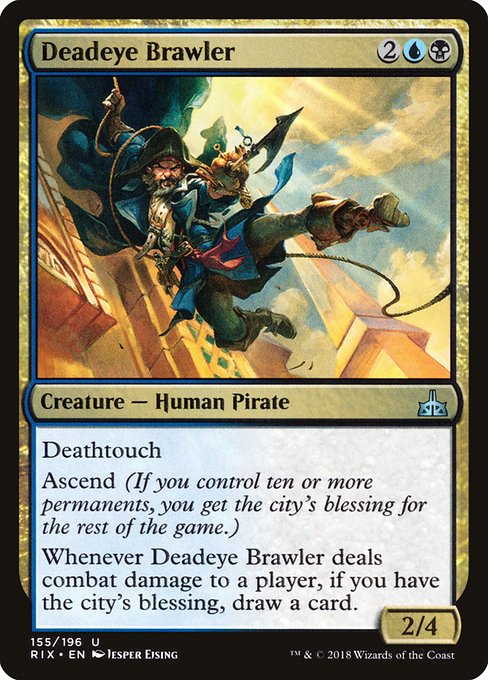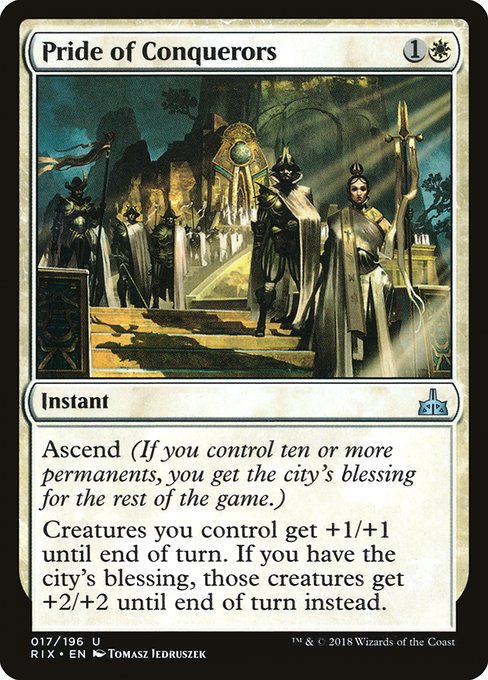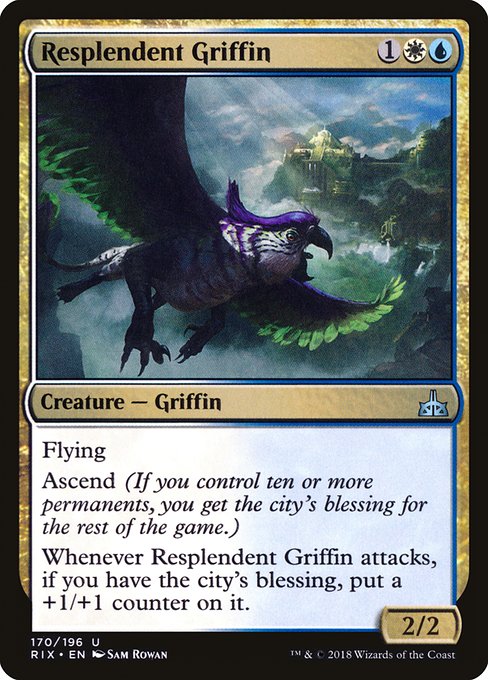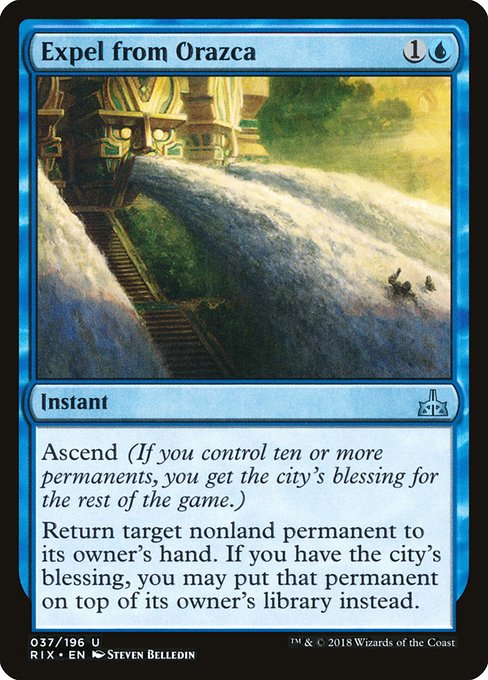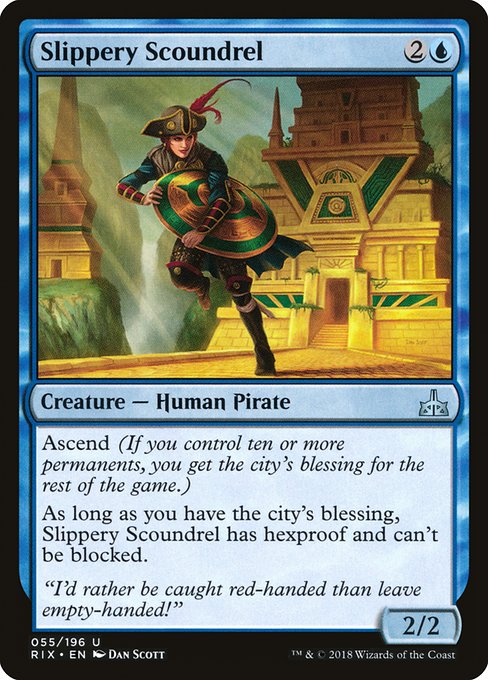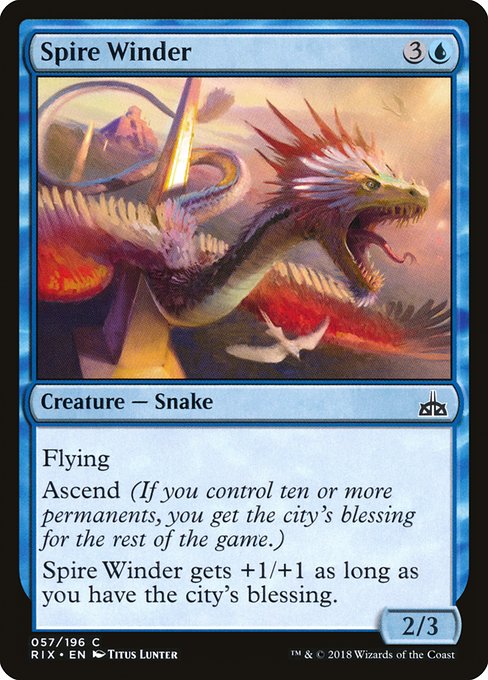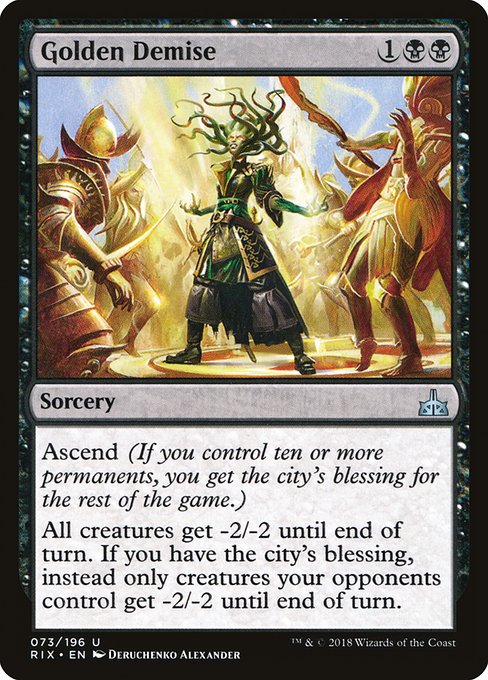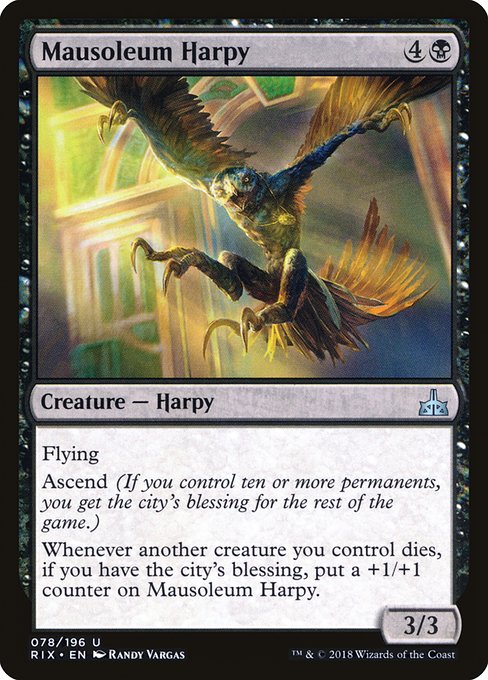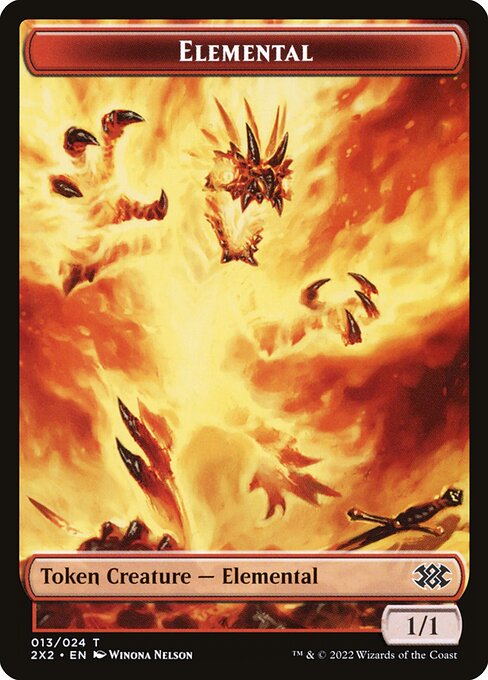standard
future
historic
gladiator
pioneer
explorer
modern
legacy
pauper
vintage
penny
commander
brawl
alchemy
paupercommander
duel
oldschool
premodern
Rulings
If your tenth permanent enters the battlefield and then a permanent leaves the battlefield immediately afterwards (most likely due to the “Legend Rule” or due to being a creature with 0 toughness), you get the city’s blessing before it leaves the battlefield.
If you control ten permanents but don’t control a permanent or resolving spell with ascend, you don’t get the city’s blessing. For example, if you control ten permanents, lose control of one, then cast Golden Demise, you won’t have the city’s blessing and the spell will affect creatures you control.
Whether you have the city’s blessing is checked only as the delayed triggered ability resolves during the end step. The tokens you create can help you ascend.
Some cards have triggered abilities that check if you have the city’s blessing, but don’t use an intervening “if” clause. These abilities trigger regardless of whether you have the city’s blessing and check whether you do only as they resolve.
As each Elemental token enters the battlefield, you choose which opponent or opposing planeswalker it’s attacking. It doesn’t have to attack the same player or planeswalker that Tilonalli’s Summoner is attacking.
Once you have the city’s blessing, you have it for the rest of the game, even if you lose control of some or all of your permanents. The city’s blessing isn’t a permanent itself and can’t be removed by any effect.
A permanent is any object on the battlefield, including tokens and lands. Spells and emblems aren’t permanents.
If you cast a spell with ascend, you don’t get the city’s blessing until it resolves. Players may respond to that spell by trying to change whether you get the city’s blessing.
Ascend on a permanent isn’t a triggered ability and doesn’t use the stack. Players can respond to a spell that will give you your tenth permanent, but they can’t respond to getting the city’s blessing once you control that tenth permanent. This means that if your tenth permanent is a land you play, players can’t respond before you get the city’s blessing.
If you control ten permanents but don’t control a permanent or resolving spell with ascend, you don’t get the city’s blessing. For example, if you control ten permanents, lose control of one, then cast Golden Demise, you won’t have the city’s blessing and the spell will affect creatures you control.
Whether you have the city’s blessing is checked only as the delayed triggered ability resolves during the end step. The tokens you create can help you ascend.
Some cards have triggered abilities that check if you have the city’s blessing, but don’t use an intervening “if” clause. These abilities trigger regardless of whether you have the city’s blessing and check whether you do only as they resolve.
As each Elemental token enters the battlefield, you choose which opponent or opposing planeswalker it’s attacking. It doesn’t have to attack the same player or planeswalker that Tilonalli’s Summoner is attacking.
Once you have the city’s blessing, you have it for the rest of the game, even if you lose control of some or all of your permanents. The city’s blessing isn’t a permanent itself and can’t be removed by any effect.
A permanent is any object on the battlefield, including tokens and lands. Spells and emblems aren’t permanents.
If you cast a spell with ascend, you don’t get the city’s blessing until it resolves. Players may respond to that spell by trying to change whether you get the city’s blessing.
Ascend on a permanent isn’t a triggered ability and doesn’t use the stack. Players can respond to a spell that will give you your tenth permanent, but they can’t respond to getting the city’s blessing once you control that tenth permanent. This means that if your tenth permanent is a land you play, players can’t respond before you get the city’s blessing.
Rulings
If your tenth permanent enters the battlefield and then a permanent leaves the battlefield immediately afterwards (most likely due to the “Legend Rule” or due to being a creature with 0 toughness), you get the city’s blessing before it leaves the battlefield.
If you control ten permanents but don’t control a permanent or resolving spell with ascend, you don’t get the city’s blessing. For example, if you control ten permanents, lose control of one, then cast Golden Demise, you won’t have the city’s blessing and the spell will affect creatures you control.
Whether you have the city’s blessing is checked only as the delayed triggered ability resolves during the end step. The tokens you create can help you ascend.
Some cards have triggered abilities that check if you have the city’s blessing, but don’t use an intervening “if” clause. These abilities trigger regardless of whether you have the city’s blessing and check whether you do only as they resolve.
As each Elemental token enters the battlefield, you choose which opponent or opposing planeswalker it’s attacking. It doesn’t have to attack the same player or planeswalker that Tilonalli’s Summoner is attacking.
Once you have the city’s blessing, you have it for the rest of the game, even if you lose control of some or all of your permanents. The city’s blessing isn’t a permanent itself and can’t be removed by any effect.
A permanent is any object on the battlefield, including tokens and lands. Spells and emblems aren’t permanents.
If you cast a spell with ascend, you don’t get the city’s blessing until it resolves. Players may respond to that spell by trying to change whether you get the city’s blessing.
Ascend on a permanent isn’t a triggered ability and doesn’t use the stack. Players can respond to a spell that will give you your tenth permanent, but they can’t respond to getting the city’s blessing once you control that tenth permanent. This means that if your tenth permanent is a land you play, players can’t respond before you get the city’s blessing.
If you control ten permanents but don’t control a permanent or resolving spell with ascend, you don’t get the city’s blessing. For example, if you control ten permanents, lose control of one, then cast Golden Demise, you won’t have the city’s blessing and the spell will affect creatures you control.
Whether you have the city’s blessing is checked only as the delayed triggered ability resolves during the end step. The tokens you create can help you ascend.
Some cards have triggered abilities that check if you have the city’s blessing, but don’t use an intervening “if” clause. These abilities trigger regardless of whether you have the city’s blessing and check whether you do only as they resolve.
As each Elemental token enters the battlefield, you choose which opponent or opposing planeswalker it’s attacking. It doesn’t have to attack the same player or planeswalker that Tilonalli’s Summoner is attacking.
Once you have the city’s blessing, you have it for the rest of the game, even if you lose control of some or all of your permanents. The city’s blessing isn’t a permanent itself and can’t be removed by any effect.
A permanent is any object on the battlefield, including tokens and lands. Spells and emblems aren’t permanents.
If you cast a spell with ascend, you don’t get the city’s blessing until it resolves. Players may respond to that spell by trying to change whether you get the city’s blessing.
Ascend on a permanent isn’t a triggered ability and doesn’t use the stack. Players can respond to a spell that will give you your tenth permanent, but they can’t respond to getting the city’s blessing once you control that tenth permanent. This means that if your tenth permanent is a land you play, players can’t respond before you get the city’s blessing.
Your collection? Your decks?
Want to manage your collection and/or create decks?
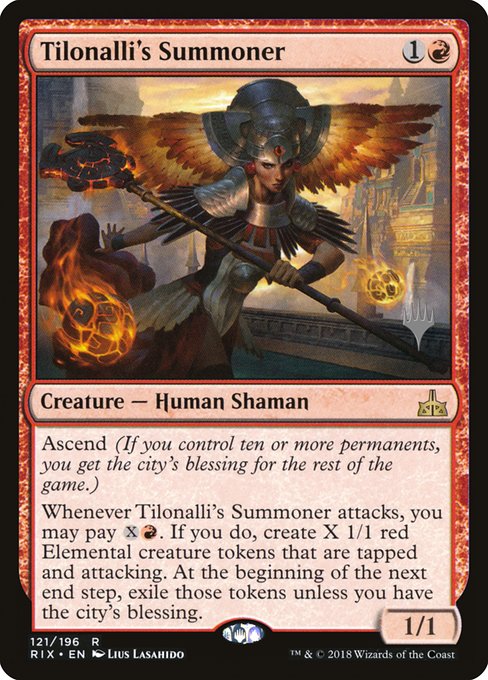

 0
0
 0.81€
0.81€
